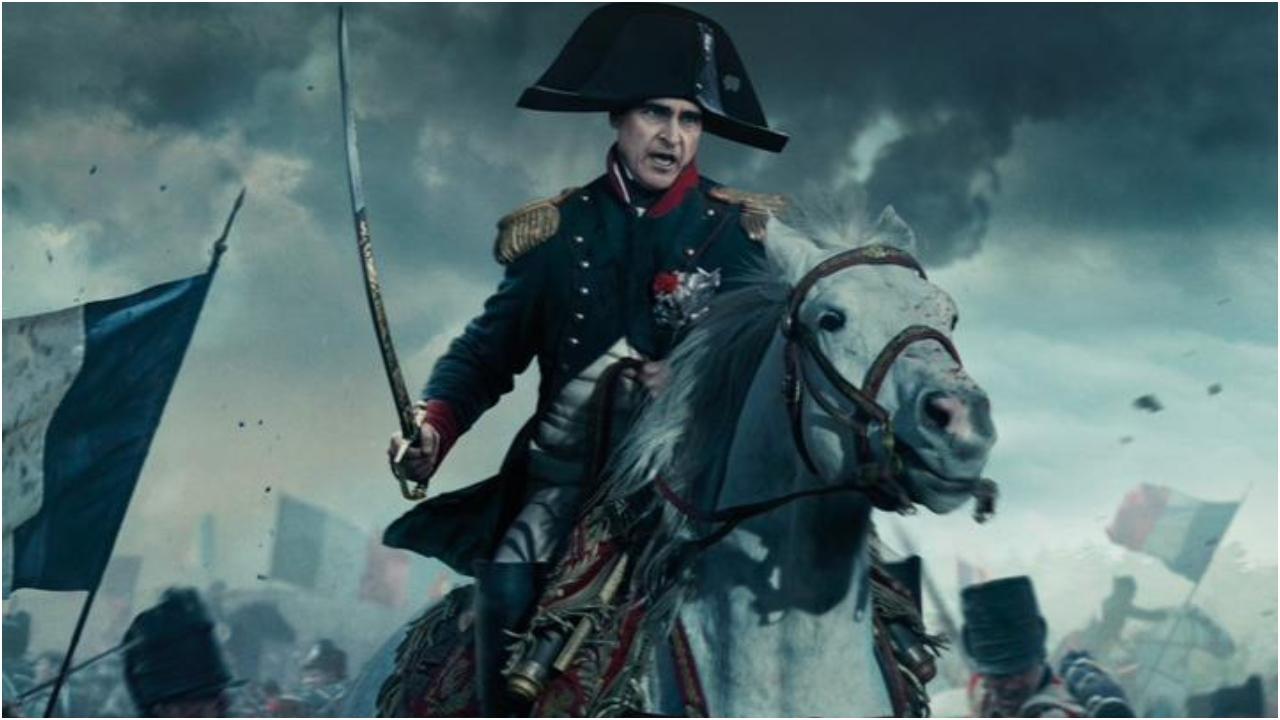Home / Entertainment / Hollywood News / Article /
Napoleon review: The romanticised felling of a historical great
Updated On: 24 November, 2023 03:55 PM IST | Mumbai | Johnson Thomas
Napoleon review: Ridley Scott manages to create yet another fascinating cinematic rendering of a biopic on the military commander

Joaquin Phoenix makes Napoleon look faultily human rather than heroic.
Film: Napoleon
Cast: Joaquin Phoenix, Vanessa Kirby, Tahar Rahim, Rupert Everett, Edouard Philipponnat, Catherine Walker, Ludivine Sagnier
Director: Ridley Scott
Rating: 3/5
Epic specialist Ridley Scott delivers yet another historical drama with a seasoned flourish. Despite the 158-minute runtime, the narrative doesn’t feel belaboured or tedious. The past master at Sci-fi spectacle and historical epics manages to create yet another fascinating cinematic rendering of a biopic on the military commander who held sway over France and Europe during the most turbulent times in its history. This is an epic that details the checkered rise and fall of French Emperor Napoleon Bonaparte and his relentless journey to power.
Scott's film takes a look at the military commander Napoleon's (Joaquin Phoenix) early years in the French army post the French Revolution events of King Louis and Queen Marie Antoinette’s dethronement and beheading, and dutifully follows his very own swift, ruthless climb to the emperor. We are made privy to his rise up in the ranks, following his many achievements in the battlefield, as viewed through the prism of his volatile relationship with his wife and one true love, Josephine (Vanessa Kirby). In essence, this is a love story that plays out over several decades of wars and political manoeuvring.
Director Ridley Scott’s action sequences are infallible. Brilliantly executed and showcased, they are the hallmark of his storytelling craft. The tone here is rather contemplative laced with dark self-deprecating humour and flashes of strong emotion. Scott and Phoenix’s Napoleon is a strategist who appears to swing with the political tide while reaching out for the pinnacle of power. Apparently, the original Apple streaming version was 2 hours longer and given the dictates for a theatre version, it got truncated to the current 158 min version. So it’s a given that this film is bound to feel a little rushed, disjointed and tonally confusing. The drama doesn’t get fleshed out and the weak middle crammed with events from history and characters from different time periods, fails to register. This feels like a butchered cut but there’s no taking away from the sheer beauty of the camerawork, battle choreography, amazing production design, costuming, CGI, a sweeping background score that uses classical and French folk tunes as its mainstay and meticulous post-production work.
Joaquin Phoenix makes Napoleon look faultily human rather than heroic. Bonaparte’s achievements are all there to be admired and appreciated but it’s his human quality, warts and all, insecure and obsessive in love, that comes through more readily here. Scott's ‘Napoleon’ is a trifle baffling as it takes us through decades of various major events and battles beginning with the siege of Toulon in 1793. We see him as a man in love and on the sidelines as a battle strategist who stumbles through to greatness. We barely get to see him as a great politician or a powerful tactician or commander. Such is the primacy of the romance in this telling. The writing falters majorly on that aspect. The focus here was more on setpieces and his troubled relationship with Josephine, than on him as a ruthless and cunning emperor.
As far as historical accuracy goes, it does seem like Scott and his scriptwriter have taken many liberties to depict the love story above all else. Early on in the film, Napoleon is shown to have abandoned a battle at the Egyptian pyramids because of Joséphine’s adulterous ways. Later, after their divorce, he marches on Paris breaking away from his exile on the island of Elba, because he hears of the Russian Tsar Alexander’s tryst with Josephine. Both events are distorted to suit the romanticised storytelling here. Joséphine died of pneumonia in 1814 and Napoleon marched to Paris in 1815 to regain power.
Scott in fact leaves us with a Napoleon who loved Josephine, whose massive ego and megalomania caused wars with a death toll totalling millions. Napoleon the multifaceted man whose military accomplishments are still revered, is lost in this brutally truncated byplay of love and ruination.



